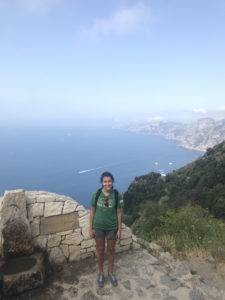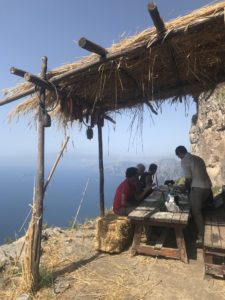I have now completed three weeks in Sorrento and have noticed a great improvement in my language comprehension. Whenever I am around Italians, whether that’s walking down the street, in a restaurant, or on the train, I will people watch and catch bits of their conversations. I learn a lot about the town and life here that way. For example, I hear people complaining that it is too cold if the weather drops below 27 degrees Celsius (which is 80 degrees Fahrenheit). I also hear about events I otherwise would not have known about, such as an eclipse that is happening on July 27 and a jazz festival in the Piazza at the end of July.
However, there have been a few times when I felt as though I have not been studying Italian for 3 years because I could not comprehend a single word in an entire conversation. It turns out that many casual conversations that locals have with each other are done in a dialect that sounds like Italian, but is totally different. Curious to learn more, I asked (in standard Italian) a few locals about it. In general, I was told that they consider the Neapolitan dialect a separate language and the variations of it that are spoken in different towns of the Campania region its dialects. Some general characteristics of Neapolitan are cutting off the ends of verbs and pronouncing “e” and “o” at the ends of words the same.
A younger man told me about the slang word “fra,” which is short for “fratello” (meaning brother). It is equivalent to saying “bro” in English. “Fra” in Italian means “between,” so I learned that the meaning of some words differ in Neapolitan. Neapolitan is like English in the way that teenagers use slang words that adults don’t understand or utilize. “Fra” is an example of this. Another common phrase that is used by adults is “a salut vost,” which translates to “to your health.” This phrase is said when giving a toast with drinks. It demonstrates the guillotining of the final vowel of words.
One of the locals I asked about the local dialect was my guide Anna for the Path of the Gods hike. The hike goes along the Amalfi Coast, so it has some amazing views.

There is a shepherd named Antonio who lives off the land near the Path of the Gods, so we stopped at his house to try his produce, olive oil, goat cheese and juice. It was all delicious and so fresh.

At the end of the hike, Anna and I stopped in a bar before going our separate ways. The owner served us “granita al limone” (a lemon slushee drink) and thanks to all that I had learned, I was able to toast to his good health in Neapolitan.
Thanks for reading!
Jane